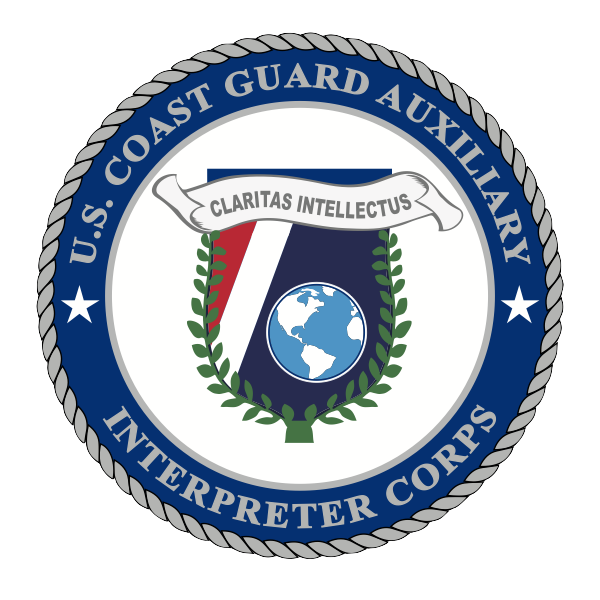AUX Interpreter Corps (AIC)

|
The Auxiliary Interpreter Corps (AIC) is a component of the USCG Auxiliary International Affairs Directorate comprising over 350 volunteer interpreters and 57 languages. AIC linguists directly augment the Coast Guard by temporarily filling active duty billets, and they provide language services that help USCG Auxiliary districts overcome language barriers with their members and the public in support of their mission goals. The AIC supports the USCG Language Access Plan. |
Services
The Interpreter Corps provides two main services: Interpretation and Translation.
Interpretation: Facilitate in-person, face-to-face or remote over-the-phone and video link conversations in multiple languages, allowing for effective communication during USCG missions, or for Auxiliary vessel safety checks (VE), public education (PE) classes, public affairs (PA) events, member training (MT) and recruiting.
Translation: Translate written materials to ensure faithful resemblance and reproduction of manuals, documents, agreements, emails, training materials, conference minutes and notes, as well voice recordings and transcriptions, from one language to another.
Linguists
Our interpreters are selected for missions based on their language level skills, their availability and readiness, as well as their subject matter expertise (SME). Obtaining units and districts additionally benefit from their professional and personal knowledge, as well as their Auxiliary training, expertise and qualifications in other areas.
The Interpreter Corps does not teach languages. It draws on the linguistic skills independently acquired by our members. Many members have lived and worked in various countries overseas or grew up in multi-cultural families and can therefore provide additional insight to foreign customs, norms and traditions.
Language Proficiency: Auxiliary Linguists have a minimum language proficiency that broadly aligns to the Interagency Language Roundtable (IRL) score of 2+ or higher in oral communication, verbal interpretation and written translation. This level assures an interpreter can satisfy at a minimum most work requirements with language usage that is often, but not always, acceptable and effective. Many interpreters have much higher scores, but even if expert, none should be considered at a professional level. ILR based scoring is used by active duty USCG, Dept. of Defense, and many US agencies for language skill assessment.
Auxiliary Qualifications: active Interpreter Corps members are also current in AUX Core Training, have completed FEMA ICS 100 /700 and Introduction to Risk Management classes, and are either basically qualified (BQ) or in Operational Auxiliarist (AUXOP/AX/AX2) status.
Security Qualification: All AUX linguists have at a minimum Operational Support (“OS”) Personal Security Investigation (PSI) status based on an annual PSI review. This check is a NCIC-III (National Crime Information Center-Interstate Identification Index) search run against databases that have multi-law enforcement agency ties which are used by virtually all law enforcement and military agencies. OS Status is NOT a Security Clearance. It provides authorization For Official Use Only (FOUO) material and data access.
Aux Linguists deploying also sign the DHS Non-disclosure Agreement (NDA). Currently 116 linguists have additionally a full Tier 3 Security Clearance which makes them SECRET clearance-ready and is the same SF-86 investigation that active duty USCG, military and civilian employees undergo. Upon request by CG Order Issuing Authority, additional linguists can be processed for Tier 3 level Security Clearances which takes several months and is subject to budget and DIRAUX approval.
Other Qualifications Many Auxiliarists may additionally have other USCG or professional qualifications including legal, medical, cyber, culinary, engineering, vessel examination, surface operations, container inspection, marine safety, USCG masters licenses, helm and watch stander, TCO /communications and other qualifications.
Some linguists completed SERE 100, AT Level 1, hold official passports and meet additional CCMD requirements, including vaccinations. Obtaining units generally have to assist in obtaining these additional CG qualifications.